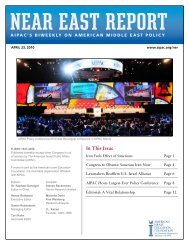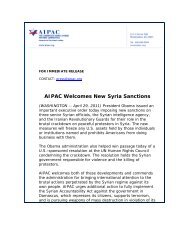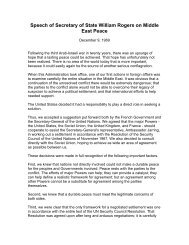2013 Briefing Book - Print Version - Aipac
2013 Briefing Book - Print Version - Aipac
2013 Briefing Book - Print Version - Aipac
You also want an ePaper? Increase the reach of your titles
YUMPU automatically turns print PDFs into web optimized ePapers that Google loves.
SYRIA-LEBANON<br />
ASSAD REJECTED U.S. OUTREACH EFFORTS<br />
As part of the Obama administration’s emphasis on engagement, U.S. policy toward Syria<br />
during the early part of the president’s first term focused on a renewed effort to encourage<br />
Damascus to distance itself from Iran and become a more productive regional actor. In 2010,<br />
five years after the United States withdrew its ambassador following the assassination of<br />
Lebanese Prime Minister Rafik Hariri, the Obama administration announced its nomination<br />
of career Foreign Service officer Robert Ford as the ambassador to Syria. Following attacks<br />
both on the U.S. Embassy in Damascus and on Ambassador Ford personally, he was<br />
confirmed by the Senate in October 2011, mere days before he had to return to Washington<br />
for what the U.S. State Department called “credible threats to his personal safety.”<br />
In addition to Ford’s appointment as ambassador, senior U.S. officials have taken more than<br />
a dozen trips to Damascus during the past several years in efforts to communicate U.S. goals<br />
to the Syrian leadership and press the regime to end its destabilizing behavior. This outreach<br />
culminated in a meeting between Secretary of State Hillary Clinton and Syrian Foreign Minister<br />
Walid Mouallem in September 2010.<br />
Syrian Preconditions Have Derailed Talks with Israel<br />
During the Oslo era of the 1990s, Israel and Syria engaged in U.S.-sponsored talks culminating<br />
with the January 2000 meeting between then-Israeli Prime Minister Ehud Barak and then-Syrian<br />
President Hafez al-Assad. Although the parties appeared close to finalizing an agreement, a deal<br />
could not be reached. Assad died six months later, and his son Bashar al-Assad assumed the<br />
presidency. Since that time, Syria and Israel have negotiated on and off through third parties.<br />
In 2007 and 2008, Turkey facilitated indirect negotiations between the two nations. However,<br />
following Israel’s defensive operations in Gaza at the end of 2008 and the beginning of 2009,<br />
Syria suspended peace talks with Israel. Subsequently, Syria imposed a precondition before<br />
it would resume any peace talks: an Israeli commitment to a full withdrawal from the Golan<br />
Heights to what Syria views as the pre-June 1967 borders. Syrian leaders also had stated that<br />
Damascus will continue to support terrorist groups and have close relations with Iran even if it<br />
reaches a peace agreement with Israel.<br />
With Assad launching his brutal campaign against his own people, peace talks are obviously<br />
moribund. Israeli leaders have said that the Middle East will be better off without Assad in<br />
power and predicted his eventual removal from the presidency.<br />
162








